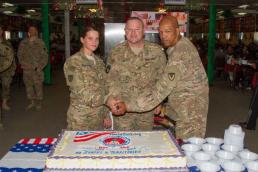Courtesy Story: Sgt. David Beckstrom
Posted on: January 4, 2016
 Courtesy Photo:Sgt. David Beckstrom
Courtesy Photo:Sgt. David Beckstrom
The adjutant generals of the Utah, Texas, Puerto Rico and Alabama National Guard, along with general officers from the U.S. Army Reserve, took part in a four-day conference to better see how their Soldiers and Airmen support U.S. Army Central’s mission in Southwest Asia, Dec. 10-13. The Total Force concept was a major topic of discussion and focuses on the partnership between the active duty, National Guard and Reserve components as they work hand-in-hand to ensure the security and safety of people around the world and build enduring partnerships. (U.S. Army photo by Sgt. David N. Beckstrom, 19th Public Affairs Detachment, U.S. Army Central)
CAMP ARIFJAN, Kuwait – The Adjutant Generals of the Alabama, Puerto Rico, Texas and Utah National Guard and general officers from the U.S. Army Reserve, took part in a four-day conference here, Dec. 10-13 to gain insight on how their Soldiers and Airmen support U.S. Army Central’s mission in Southwest Asia.
A major focus of the event was the Army’s Total Force concept, which aligns the active duty, National Guard and Reserve components of the Army as one force to ensure readiness and resource efficiency.
“The military expects the reserve components to maintain the same standard as the active duty component,” said Air Force Maj. Gen. John Nichols, the Adjutant General of the Texas National Guard based out of Austin, Texas. “We accomplish this by partnering with the active duty components in Texas for training and mentorship. This allows us to remain proficient in our assigned roles and ready to serve our nation when the call comes.”
During the visit, the generals interacted closely with their Soldiers. They were able to see what they do on a daily basis and what contributions the National Guard and U.S. Army Reserve make to USARCENT.
“Since the first Minuteman left their plows, picked up their rifles and moved to the sound of guns more than 379 years ago, National Guardsmen have been fighting our nation’s wars and defending the homeland,” said Maj. Gen. Jefferson Burton, the adjutant general of the Utah National Guard based out of Draper, Utah. “These Soldiers serving in Kuwait represent America’s finest. They are our ambassadors. They are smart, talented, and passionate about what they do. They are volunteers who serve to make the world a more secure place.”
“We work to align the needs and efforts of the Army’s mission around the world with the training of our units,” said Brig. Gen. James Blankenhorn, the Deputy Commanding General of the Reserve Chemical, Biological, Radiological and Nuclear Forces stationed out of Salt Lake City, Utah. “We ensure the service members understand the importance of their missions and that they are fully manned, equipped and trained to accomplish it.”
Service members work together in an inter-department setting to accomplish their missions both in the U.S. and around the world with partner nation forces.
“Since our nation’s inception, citizen Soldiers have been an integral part of our national defense,” said Burton, a native of Payson, Utah. “Nowhere is that more evident than what’s happening in Kuwait today. Soldiers from every component, Active, Guard and Reserve, are training to the same standard, and serve side-by-side with our international partners to make our world more secure.”
These general officers came to Kuwait to ensure their Soldiers are accomplishing their mission and that they are meeting the standard. This will facilitate potential policy changes to train, equip and prepare Soldiers for future missions.
“Being proficient in our job as a reserve unit allows us to augment and support the Army by deploying and assisting other units that might need our help,” said Sgt. Erika Sledge, a squad leader with 366th CBRN Company out of Savannah, Georgia. “Everybody in the military have different jobs and missions, but when we work together we can achieve great things.”
Service members in the National Guard and Reserve components serve the nation by being citizen Soldiers, this means that they are entrepreneurs, construction workers or civil workers while still serving in the U.S. military.
“I have spoken to several service members from the Reserve component,” said Blankenhorn, a native on Atlanta, Georgia. “They are all saying the same thing, ‘we are learning great things while we are out here.’ This shows the dedication and commitment each of these Soldiers have to their nation, community and families. We will continue to train our Reservists to be ready to mobilize should the need arise.”
“Like many other cities across the nation, the impact of war touches the entire community,” said Burton. “The National Guard is the connective fabric to our communities, and that connection has proven vital to maintaining the nations will in confronting these global challenges.”